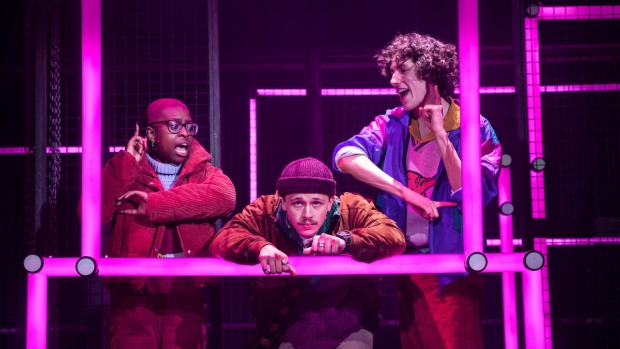LIFT the Musical at Southwark Playhouse – review
A dynamic production of a show more convoluted than the London Underground Network

© Mark Senior
For the less patient among us, the period of time spent waiting for a lift can be one of the most tedious in our day, a moment of apprehension in which we relinquish all control of the speed of our journey. Taking the stairs or escalator, though harder work, affords us an agency in our travel that the lift does not, and it's for this reason I have long avoided any underground station where a lift is the primary exit. Similarly, audiences have long awaited the return of LIFT the Musical, which has scarcely been produced since it first debuted at the Soho Theatre just under a decade ago. Now, with a crowd of dedicated theatre fans gathered like rush hour commuters, it finally arrives in a bold new production at Southwark Playhouse with a thrilling cast and the promise of some creative reworking. Regrettably, the anticipation of its opening proved more exciting than the show itself.
LIFT follows a busker at a moment of profound personal revelation and sees him processing his own grief through imagining similarity in the lives of strangers he shares a lift with at Covent Garden station. Though he only overhears snippets of conversations, the one-act show largely takes place outside of a lift where it expands on the perhaps imagined lives of these individuals (somewhat heavy-handedly, everyone is named either Sarah, Kate or Gabriel). In reality, far more of the plot transpires in a BDSM dungeon than a lift, though this title for the show would be admittedly less marketable.
In the production notes, composer-lyricist Craig Adams talks about an effort to make the busker's story clearer in this production, acknowledging the ambiguity of the original and hoping for more transparency here. Without having seen the show's premiere production to compare, the plot remains far from clear, with a muddled sense of structure and identity that leaves it ultimately deeply unsatisfying and even inaccessible. A scene in which two of the performers play rogue social media avatars pulls the audience down a bizarre rabbit hole of dizzying suspended reality while an awkward exchange between two dancers (both ballet/erotic) quickly turns uncomfortable. To his credit, Adams' contemporary score pulses with as much vitality and thrill as it did in 2013 and is even further enhanced in the capable hands of musical director Sam Young who has provided new arrangements and is presumably responsible for the rapturous vocal harmony. What problems the show has lie squarely at the feet of Ian Watson's book.
When the show was first seen it boasted an astonishing cast, some of whom would soon ascend to super stardom, and this latest incarnation of LIFT feels no different, with director Dean Johnson having assembled some rising stars alongside hugely promising graduates to create an octet of phenomenal talent. Kayleigh McKnight's stratospheric vocal chops have long held the promise of West End stardom, but it is her gripping acting through song here as the deeply repressed lesbian French teacher that makes the hugely popular "Lost in Translations" the standout moment of the show. Predictably, her rendition of this, inarguably the strongest song in the show's score, is worth the price of admission.
Just as brilliant to behold is the professional debut of new graduate Tamara Morgan, who impresses early in the show's ninety-minute runtime as a dance student-turned-dominatrix with her ability to make even the dryer sections of the book feel fresh and authentic. As we continue, she is afforded an even greater chance to shine, and if McKnight's blistering belting has already blown the roof off the Elephant and Castle venue, Morgan's scorching performance of "It's Been a Year" just about sets fire to the entire postcode. Much too must be said about Chrissie Bhima, another graduate performer, who had been set to take over as the new leading lady in Andrew Lloyd Webber's Cinderella prior to the show's unexpected closure. Here she proves her worth with unquestionable stage presence and force that consistently draws the eye – one to watch exceptionally closely.
Faced with insurmountable material, Dean Johnson at least stages the production marvellously, with designer Andrew Exeter installing perhaps the most expensive set this venue has ever seen, all colourful neon tubes and descending grates. Johnson proves himself expert in how to utilise an ensemble and, though their reappearance during solo numbers initially feels unwelcome, it is impossible not to be charmed by the striking staging. Whether it is melancholic umbrella-ography or the frantic blue neon recreation of London sights, the rich visuals are more than enough to keep you entertained.
In the years since LIFT was first performed similar shows have found success as abstract song cycles, needing only a vague plot to tie together a collection of winning contemporary compositions and given the strength of this show's score, this feels a potentially more viable option unless some more major retooling takes place to deliver a satisfying and comprehensible narrative. The vocal fireworks, at least, will carry you to your destination even if the story does not.












